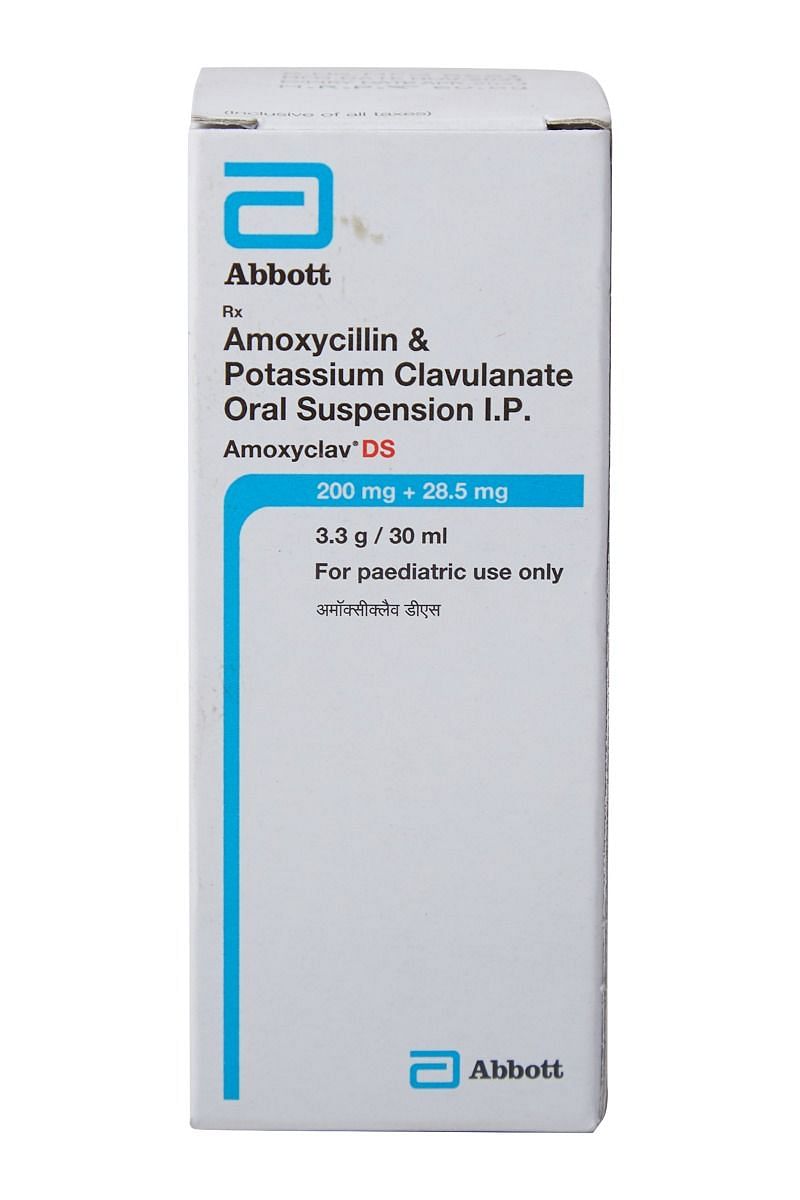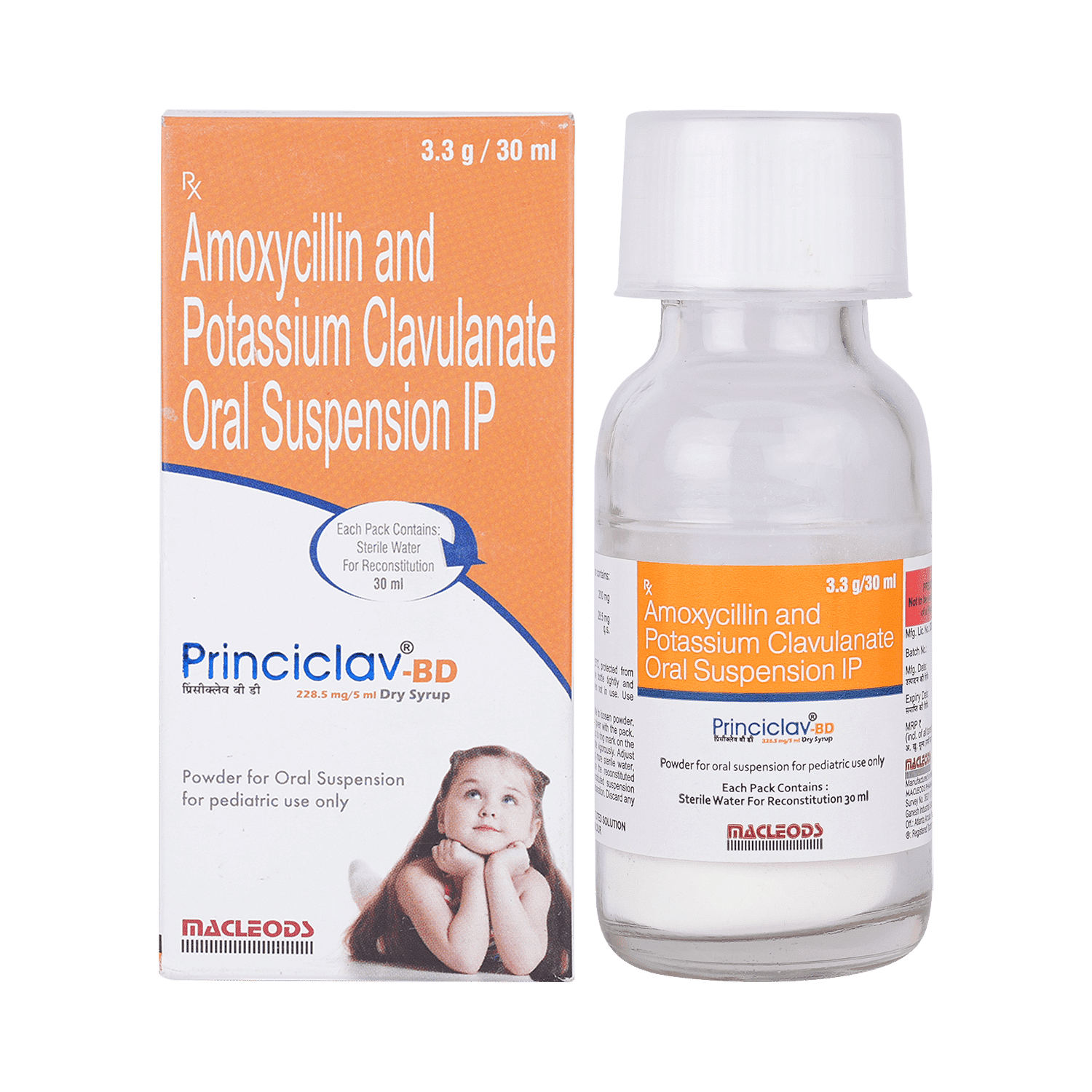
Clavin Dry Syrup
Manufacturer
Ajanta Pharma Ltd
Salt Composition
Amoxycillin (200mg) + Clavulanic Acid (28.5mg)
Key Information
Short Description
Clavin Dry Syrup is an antibiotic used to treat bacterial infections in various parts of the body, including the ear, nose, throat, chest, lungs, teeth, skin, and urinary tract.
Dosage Form
Dry Syrup
Introduction
Clavin Dry Syrup is an effective antibiotic medicine designed to combat bacterial infections in multiple areas such as the ear, nose, throat, chest, lungs, teeth, skin, and urinary tract. It is particularly useful in treating bacteria that have developed resistance to other antibiotics, making it a valuable option for resistant tuberculosis as well. While it is generally safe, it is crucial to complete the full course of treatment to prevent the bacteria from multiplying or becoming resistant. Always consult a healthcare provider before starting or stopping this medication.
Directions for Use
Administer Clavin Dry Syrup to your child as prescribed by the doctor. Ensure the full course is completed even if symptoms improve. Do not share the medication with others.
How it works
Clavin Dry Syrup contains two active agents: amoxycillin and clavulanic acid. Amoxycillin prevents the formation of the bacterial cell wall, essential for bacterial survival. Clavulanic acid inhibits beta-lactamase, an enzyme produced by resistant bacteria, making the combination effective against various infections.
Quick Tips
Your child must complete the entire course of antibiotics. Stopping too soon may cause the bacteria to multiply again, become resistant, or cause another infection. Your child may have a bitter taste in the mouth after the intake of Clavin Dry Syrup. Eating citrus fruit or sipping plenty of water or fruit juice may help. Encourage your child to drink plenty of water in case diarrhea develops as a side effect. Never give Clavin Dry Syrup until and unless prescribed by the doctor. You must also never share your child’s medicine with anyone else even if they show similar symptoms. Do not give Clavin Dry Syrup to treat common cold and flu-like symptoms caused by viruses. Never save medicine for future illnesses. It cannot be said whether the same medicine will work on future infections. Check ‘expiry’ before giving Clavin Dry Syrup to your child. Immediately discard all the expired medicines. Stop Clavin Dry Syrup immediately if your child develops an itchy rash, facial swelling, or breathing difficulty. Report to the doctor without any delay.
Related Medicines

Advent 228.5mg Dry Syrup Tangy Orange

Moxikind-CV Dry Syrup

Amoxyclav Dry Syrup

Princiclav -BD Dry Syrup

Moxit CV Dry Syrup

Dentoclav 200mg/28.5mg Dry Syrup

Moxtive Clav Dry Syrup

Moxiphar-CV Dry Syrup

Moxylik Dry Syrup

Alnos CV Dry Syrup
Frequently asked questions
Can other medicines be given at the same time as Clavin Dry Syrup?
Clavin Dry Syrup may interact with other medications or substances. It is crucial to inform your child's doctor about any other medications your child takes before starting Clavin Dry Syrup. Additionally, consulting a healthcare professional for guidance on administering medication to your child is always recommended.
Can I get my child vaccinated while on treatment with Clavin Dry Syrup?
Antibiotics generally do not interfere with the ingredients in vaccines or cause adverse reactions in children who have recently received a vaccine. However, it is best to wait for your child to recover from the illness before administering any vaccinations, especially if they are undergoing antibiotic treatment.
Which lab tests may my child undergo while taking Clavin Dry Syrup on a long-term basis?
During prolonged therapy, periodic kidney and liver function tests may be recommended by your doctor to monitor your child's condition effectively.
Can I give a higher than the recommended dose of Clavin Dry Syrup to my child?
Giving a higher dose of this medication increases the risk of side effects. If your child experiences worsening symptoms, consult your doctor for an evaluation and possible dosage adjustments.
Can I stop giving Clavin Dry Syrup to my child when the symptoms are relieved?
No, do not discontinue Clavin Dry Syrup without first completing the entire course prescribed by your doctor. Even if you see improvements, it's essential to continue the treatment as antibiotics may still be providing beneficial effects during the healing process.
Can the use of Clavin Dry Syrup cause diarrhea?
Yes, Clavin Dry Syrup may cause diarrhea. It is important to note that this medication kills harmful bacteria. Additionally, it can affect the healthy bacteria in your child's stomach, leading to diarrhea. Encourage your child to consume plenty of fluids and report any persistent or worsening symptoms to a healthcare professional.
Do all viral common colds result in secondary bacterial infection?
Most cases of viral common cold infections do not lead to bacterial infections. However, antibiotics should only be used after consulting with your child's doctor for proper diagnosis and guidance.
The mucus coming out of my child’s nose is yellow-green. Is it a sign of a bacterial infection?
Yellow or green discharge from the nose does not necessarily indicate a bacterial infection in children experiencing a common cold. It's normal for mucus to thicken and change color during a cold, with symptoms typically lasting 7-10 days.
Is there any sign which shows that my child needs immediate medical attention?
Seek immediate medical attention if your child experiences serious allergic reactions (difficulty breathing or skin rashes), gastrointestinal distress (diarrhea), or signs of liver damage (unexplained weakness, pallor, vomiting). While rare, these side effects demand expert medical care.


